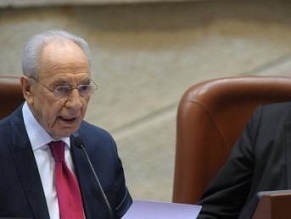|
World Jewish News

The Knesset, Israel’s parliament, will elect Tuesday Israel's next president Knesset Speaker Yuli Edelstein decided Sunday after consultating with the House's legal adviser and faction leaders.
|
Knesset to elect Tuesday Israel's 10th President
09.06.2014, Israel The Knesset, Israel’s parliament, will elect Tuesday Israel's next president Knesset Speaker Yuli Edelstein decided Sunday after consultating with the House's legal adviser and faction leaders.
Edelstein said that in the last 24 hours, he has received numerous requests from Knesset Members and jurists, who had various words of advice for him, including requests to postpone the election.
"The bad atmosphere that continues to envelope this race causes dissatisfaction from the process and casts a dark shadow on the contenders and the Knesset,” he added.
"The first citizen must also be the first in his honesty, his trustworthiness and his morality, and reach the post of president in the most honest and clean way,” Edelstein explained. “We must do everything within our power to ensure that this is the case.
One of the top candidates, Binyamin Ben Eliezer, a senior member of the Knesset from the Labor party, withdrew from the race Saturday after police interrogated him on suspicion of receiving funds illegally. Ben-Eliezer, a former Defence Minister, was considered a leading contender among the record six presidential. He was considered to have had a good chance of challenging Rivlin in a second round vote, with no candidate likely to secure the 61 votes needed for outright victory.
On Friday, police interrogated Ben-Eliezer under caution on suspicion of having illegally received large sums of money with which to purchase a luxury flat in Jaffa. The tax authority, with the consent of Attorney General Yehuda Weinstein, had conducted a review of Ben-Eliezer’s bank account, without his knowledge. Ben-Eliezer publicly protested his innocence but said it was fitting to withdraw his candidacy and hoped it “will be the last affair in the current race for the presidency.”
Five candidates are still on the run to succeed Shimon Peres as President of the State of Israel. He will be elected by the 120 members of the Knesset, Israel’s parliament, in a secret ballot.
The front-runner is former Knesset Speaker and Likud figure Reuven Rivlin, who is thought to have the support of the vast majority of both the Likud and Yisrael Beitenu factions, plus other assorted members of the Knesset.
But he will likely be short of the 61 votes needed for an outright victory and a second round of voting between the top two candidates will be most likely decisive.
Other candidates are former Knesset Speaker Dalia Itzik, Hatnuah’s former Finance Minister Meir Sheetrit, former Supreme Court Judge Dalia Dorner and Nobel Prize laureate Dan Shechtman.
Born in Jerusalem on 9 September 1939, Reuven Rivlin is a lawyer by profession and a veteran Likud Member of the Knesset. He was first elected to the parliament in 1988 and was Likud chairman from 1988 to 1993. He was Minister of Communications in 2001-2003 and served as Speaker of the Knesset from 2003-2006 and 2009-2013.
He stood against Shimon Peres in the 2007 presidential elections.
He is considered a staunch defender of Israeli democracy. Although he personally opposes the two state solution, he has said he would not intervene in the decisions of Israel’s elected politicians.
The presidency : A largely ceremonail and constitutional role
The presidency in Israel is a largely ceremonial and constitutional role. The president is not meant to play an active part in everyday Israeli political affairs.
The Israeli president holds the constitutional duties of a head of state, including signing legislation into law, pardoning prisoners and nominating a politician to form the government.
The president serves a seven year term and is limited to one term.
The president is elected by the 120 members of the Knesset. Any Israeli citizen is eligible to run.
In order to run, candidates must be endorsed by at least 10 Members of Knesset (MKs).
To be elected, the presidential candidate must receive the votes of a majority of the members of the Knesset (61 votes out of 120 MKs). If there is no majority in the first ballot, the candidate with the smallest amount of votes is eliminated and the vote is repeated.
The first President of the State of Israel was Chaim Weizmann.
EJP
|
|
